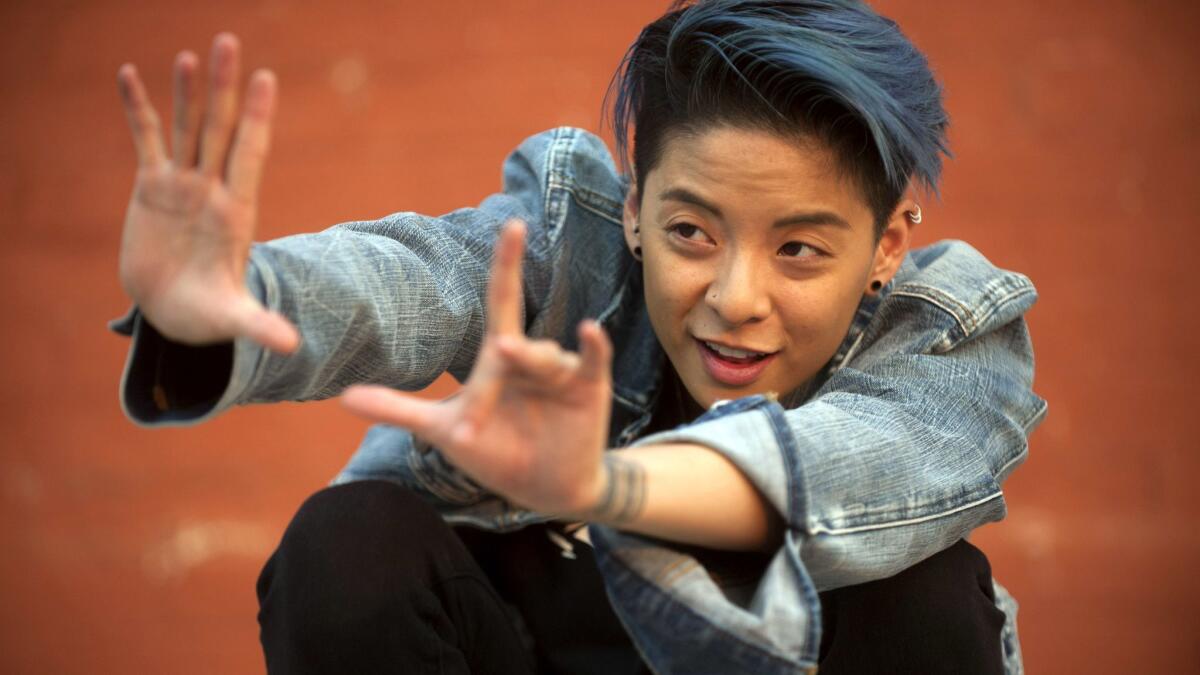Amber Liu’s show of strength: The K-pop star goes solo, with designs on U.S. stardom

- Share via
In a warehouse in an industrial stretch of Long Beach, a man dressed in black slunk up to Amber Liu and tried to grab her.
The wiry, wary Liu was ready, though, and kicked his legs out from under him. She pinned him to the ground, their shouts echoing through the hangar-sized building as a small crowd circled to watch.
The two tangled for a bit, and Liu finally got the upper hand. Confident the guy was subdued, Liu let him up. They smiled and separated, ready to go in for Round 2.
Liu, the K-pop star and member of the foundational girl group f(x), wasn’t smacking the guy around entirely for fun. She was shooting some mixed-martial-arts moves for a workout video to raise money for the Special Olympics. Behind her, Long Beach Mayor Robert Garcia watched them tussle, then joined her on-screen for a quick PSA about the charity.
Liu, one of the most recognizable stars in one of the world’s most popular genres of music, has never been afraid to take some hits. The 26-year-old Chinese American singer was born and raised in L.A., before a a South Korean label discovered her at a Koreatown festival and shot her to stardom halfway around the world in a third, new culture. But as Liu transitions into a solo artist with an eye on U.S. pop fame (she headlines the Belasco Theatre on Dec. 13), she’ll have to take up a whole different fight.
“I was terrified to go solo. It’s lonely doing it by myself,” Liu said, sitting on a weight bench after her combat session. “But I wanted to challenge myself. Sitting on my butt waiting on opportunities won’t do me any good.”
The last two years were transitional for K-pop and “hallyu,” the umbrella term for the glossy, fan-delirious pop culture originating from South Korea.
On one hand, the genre finally had its U.S. pop breakthrough when the group BTS topped the Billboard album charts in May (2012’s “Gangnam Style” was arguably its first crossover hit, but Psy’s follow-ups haven’t had the same impact). The KCON festival in downtown L.A., the largest K-pop event in America, now draws well over 100,000 fans every year for concerts, dance workshops and panels on cultural issues.
Liu comes from a generation of K-pop singers who have risen to the pinnacle of genre fame, yet now find themselves at a crossroads. Many of the first-wave K-pop groups initially tipped for U.S. success in the 2010s have recently stumbled or broken up . 2NE1, Wonder Girls and BigBang all disbanded permanently or temporarily in 2017, and Girls Generation, AOA and T-ara all had members depart the same year.
And while many new acts have risen in their place, Liu, rather than wait for the Korean major-label machine to decide her fate, is striking out on her own in America.
As a solo act in South Korea, she’s still signed to SM, the Seoul-based label conglomerate that’s shepherded some of the genre’s biggest acts. But this year, she’s testing a notably new sound, a new U.S.-focused management firm and a creative autonomy that few K-pop acts have ever enjoyed (or risked).
“Being on a K-pop label and agency, everything’s taken care of for you. The music is set up for you. Your food, manager, practice room, recording studios, all these things are in the palm of your hand. However, you know the compromise of what you can actually do or say,” Liu said.
K-pop labels have a reputation for controlling nearly every minute of their artists’ lives, from their music and tour schedules to their fashion choices, and have been reported to include clauses that regulate an artist’s romantic life.
But now, Liu said, “I’m driving the artistry. I get more freedom, but my head’s going crazy. I have no idea what I’m doing half the time now.”
Liu always stood out in f(x) because of her tomboyish aesthetic and her nimble, assertive rapping. The group was fairly experimental in its generation of K-pop, with head-spinning productions and melodies that dropped the genre’s sweetness for stranger hooks. In 2013, it was the first K-pop act to perform at the South by Southwest music festival in Texas, and its album “Pink Tape” topped many year-end lists of the best Asian pop (or any other kind).
Liu released her first solo material in 2015 and in April dropped “Rogue Rouge,” a six-song EP on Soundcloud that felt like a departure from that work. Her rhymes were edgier, the styles brasher, the music less polished but perhaps more ambitious. It set the tone for a pair of new September solo singles, “Lost at Sea” and “White Noise,” both sung in English and much more akin to the bloodletting electro-pop of Halsey, Lorde or Tove Lo than any K-pop peer.

“Lost at Sea” is, by K-pop standards, an uncommonly despairing take on a failing relationship: “There’s no help for us in sight / Nothing, no possibilities / ’Cause no matter what I do / It don’t get through to you.” It fits right in with the depressed yet steely sounds of much mainstream U.S. pop at the moment, like Billie Eilish or Maggie Rogers.
“I’m an adult, I can talk about more mature things that you don’t expect in what the group might do,” Liu said. “There’s a finesse to f(x) that I can’t do without those girls. [But] every song I had written was on the darker side, and looking back, maybe it’s because that’s who I was then.”
BTS’ success proved that K-pop acts can succeed in America without pandering to what tastemakers see as a “mainstream” (read: white) U.S. audience. But Liu’s turn toward English-language, Western-ready pop isn’t cynical either.
Liu graduated from El Camino Real high school in the San Fernando Valley, and SM scouted her at a local festival in 2008. American pop, rock and hip-hop come just as naturally to her as K-pop, and she cites hometown heroes Linkin Park as a formative influence. Her multilingual background (English, Korean and Chinese ) gives her a unique vantage to speak to different crowds.
For John Kim, an artist manager in Liu’s new U.S. management firm Steel Wool Entertainment (and a K-pop veteran who managed Girls Generation and BoA), Liu’s shift is part of the next wave of edgy Asian pop music, which may come out of K-pop but is also restless with its confines.
“She’s a global artist who can sing, rap, write and produce. She still has those roots, and the ‘K’ will always be there. But she’s her own person and artist,” Kim said. (Kim is an artist manager at the firm founded by Kevin Morrow, a former Live Nation executive.)
K-pop-reared acts like G-Dragon and Kris Wu have made inroads in U.S. hip-hop and club music. But post-BTS, such transitions face a very different pop landscape now, one arguably more hospitable but also perhaps more wide-open and confusing.
BTS “definitely helped with Asian acts coming to the U.S. It brings more awareness to the scene,” Kim said. “BoA, Rain and Wonder Girls all tried to break 10 years ago, but the timing wasn’t right. But once BTS did its thing, it’s helped open doors to give new opportunities.”

For me to do what I’m doing, Jackie Chan had to be there, Lucy Liu had to be there. Now it’s Awkwafina. We just need to keep popping up.
— Amber Liu
Liu is at an in-between place, both musically and personally. She’s a Chinese American whose entire adult life was spent pursuing stardom in another Asian country. She accomplished everything she set out to then, but she’s excited and nervous about the next steps her generation of K-pop stars need to take to stay relevant.
“I was talking with Dumbfoundead [the Korean American rapper] about this, and he said that when something becomes ‘popular,’ it’s when white people accept it,” she said.
But maybe it’s also more nuanced than that.
“I think when something becomes a trend it’s, like, ‘What is this shiny new rock?’ But then that rock becomes part of the collection. With K-pop, you had Girls Generation, 2NE1 and BigBang, and now people just know about us. K-pop’s not up and down [anymore], it just stays,” she said.
Just a few months after the expectation-shattering success of “Crazy Rich Asians,” it’s clear that the U.S. (and the rest of the world) is ready to meet new kinds of Asian narratives on their own terms, with all the complicated humanity and culture that drives them.
Liu made her career in one ascendant Asian pop-art form that helped drive that change. Now she’s hoping there’s yet another new round for her.
“For me to do what I’m doing, Jackie Chan had to be there, Lucy Liu had to be there. Now it’s Awkwafina. We just need to keep popping up,” Liu said. “Society tells you home is where you grew up or where you settled, but nah. I have friends all over the world. Maybe I have a billion homes.”
[For The Record: 10:30 A.M. Nov. 30] A profile of the singer Amber Liu incorrectly described John Kim’s title at Steel Wool Entertainment. He is an artist manager, not a co-founder.
For breaking music news, follow @augustbrown on Twitter.
More to Read
The biggest entertainment stories
Get our big stories about Hollywood, film, television, music, arts, culture and more right in your inbox as soon as they publish.
You may occasionally receive promotional content from the Los Angeles Times.











